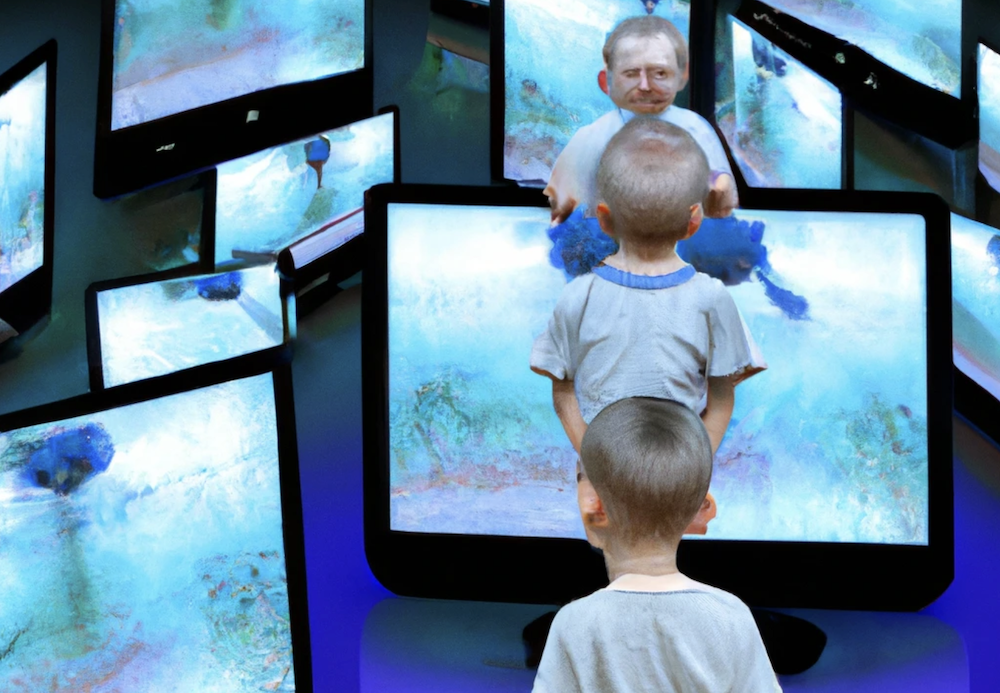
Screen Shaming or Screen Promotion – Still Mostly a Matter of Belief
Children’s screen time is a tabooed subject. Just like obesity is. That’s because it taps into whether you’re a good parent or not. But we know far too little about the effects of reduced screen time on children. Researchers at the University of Copenhagen want to do something about that.
At home with Cathrine Lawaetz Wimmelmann, associate professor in the Department of Public Health at the University of Copenhagen, there are screen conflicts. Not so much with the one-year-old daughter, whose attention span is limited to ten minutes. But with the four-year-old son, there are conflicts almost every time the screen has to be switched off. He is allowed to watch Disney movies every Saturday morning, no Youtube or Paw Patrol on the television, but he can watch ”Hr. Skæg” because with that he has taught himself the alphabet.
“Børns Vilkår asked 1044 Danish families with children about screen use. 82% reported that they have daily conflicts. That’s crazy. And we don’t have consistent rules because we don’t have any guidelines from our authorities. We know how much alcohol we can drink every week, but not how much time we can let our children use screens,” says Cathrine Lawaetz Wimmelmann.
In Denmark, the authorities have chosen not to recommend specific limits on children’s screen time, thus eschewing the precautionary principle we often use in other contexts. A few years ago, the WHO came up with some concrete time limits. Norway, the USA, and others are doing the same. Their recommendations are:
– Children under two: no screen time.
– Children between two and five: maximum one hour a day with an adult present.
– US pediatricians say two hours a day max for children over two.
Screen time can according to doctors be linked to obesity, irregular sleep, behavioral problems, impaired academic performance, violence, and less time for play.
It’s what they’re missing
The problem, says Cathrine Lawaetz Wimmelmann, is that it’s not only the screen itself but all the things they miss by spending time in front of the screen because children need to climb, experience, get sensory impressions and interact with peers, and young children don’t get that in front of a screen.
In March, she and her colleagues together with Deakin University in Melbourne will start studying the effects of reduced screen time over time. And at the same time, she is seeking funding for a so-called randomized controlled trial (RCT) study.
“We need RCTs to measure the effects of different interventions. For example, we will invite 3 groups of families with children aged 2-5 years and reduce screen time in two groups but not in the third, then measure for example attention, emotion regulation, and formation of relationships. Such studies are almost non-existent,” says Cathrine Lawaetz Wimmelmann.

The researchers hypothesize that young children’s brains are not geared to the number of stimuli that content and screens give them. Reducing screen time may therefore improve young children’s performance on cognitive tests i.g. attention tests. Also, young children have yet to form strong social networks, so screen time is taken away from important human interactions. And finally, the researchers assume that it’s a good idea to teach young children proper screen use.
40% Watches Too Much
Among the latest research on children and screen time is a major report from Vive, which surveyed over 50,000 very young children (aged 9 months to 3 years). It shows, according to Wimmelmann, that 25% of young Danish children exceed WHO recommendations for screen time and that 40% of children aged three watch too much screen compared to those recommendations. But we don’t know enough about the consequences. Some studies say it affects their social skills and attention span, while others show that it can have positive effects among older children, for example, about fine motor skills and forming social networks online she says.
“So, it depends on age. But there’s also a lot of controversy about this. Some argue for screen and others argue against screen. It’s a very polarised field because it taps into whether you’re a good parent or not,” says Cathrine Lawaetz Wimmelmann.
Thus, some researchers talk about screen shaming. While others advocate screen promotion and perceive digital behavior and screen use as a learning resource and an important part of children’s future.
“So, the knowledge we lack is not IF children should be exposed to screens, but more how and how much.”
About RCT
The RCT study will collect data on 600 families of children, who have some screen use and collects data from Statistics Denmark on the socio-economic status of the families. Then, there is data that the parents enter over three months: the children’s screen use and the children’s reactions when the screen is turned off. Data will be collected on the children’s attention functions and various tests developed for children will be used to address their well-being. Finally, there are lifestyle data that parents also provide: How does this family live; physical activity, how do they eat.
The data will be stored on protected servers and will be deleted after 5 years unless the parents have agreed to the data being used in another context.
The researchers behind the study will develop a tool to monitor children’s screen use, which parents will also test.
US authorities’ recommendations on use of screens:
Keep screens out of the bedroom
Don’t eat in front of them
Watch with your children and plan what they view
encourage active screen time
Main picture from Open AIs Dall-E with the text: Children and many screens in a phantasy way

